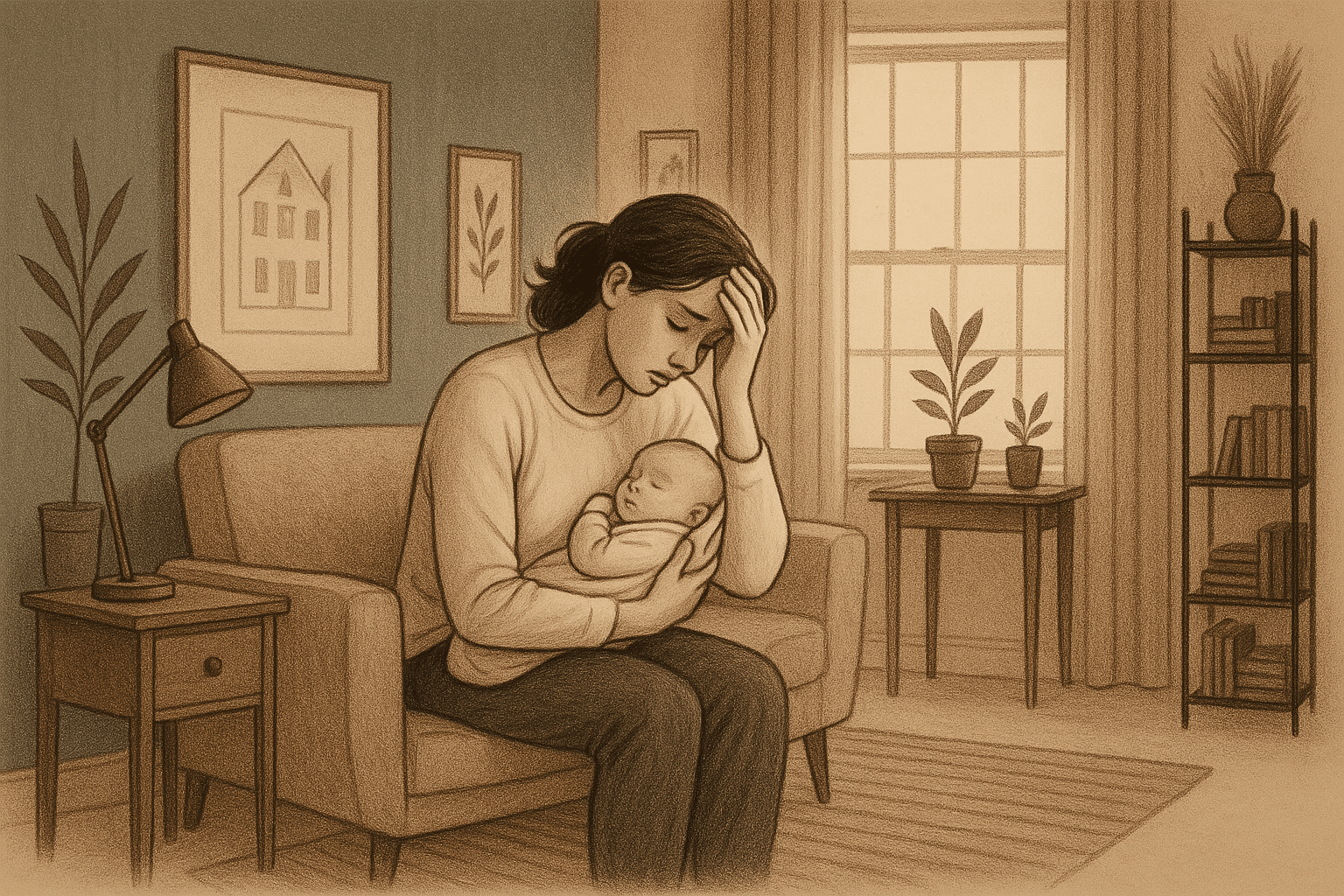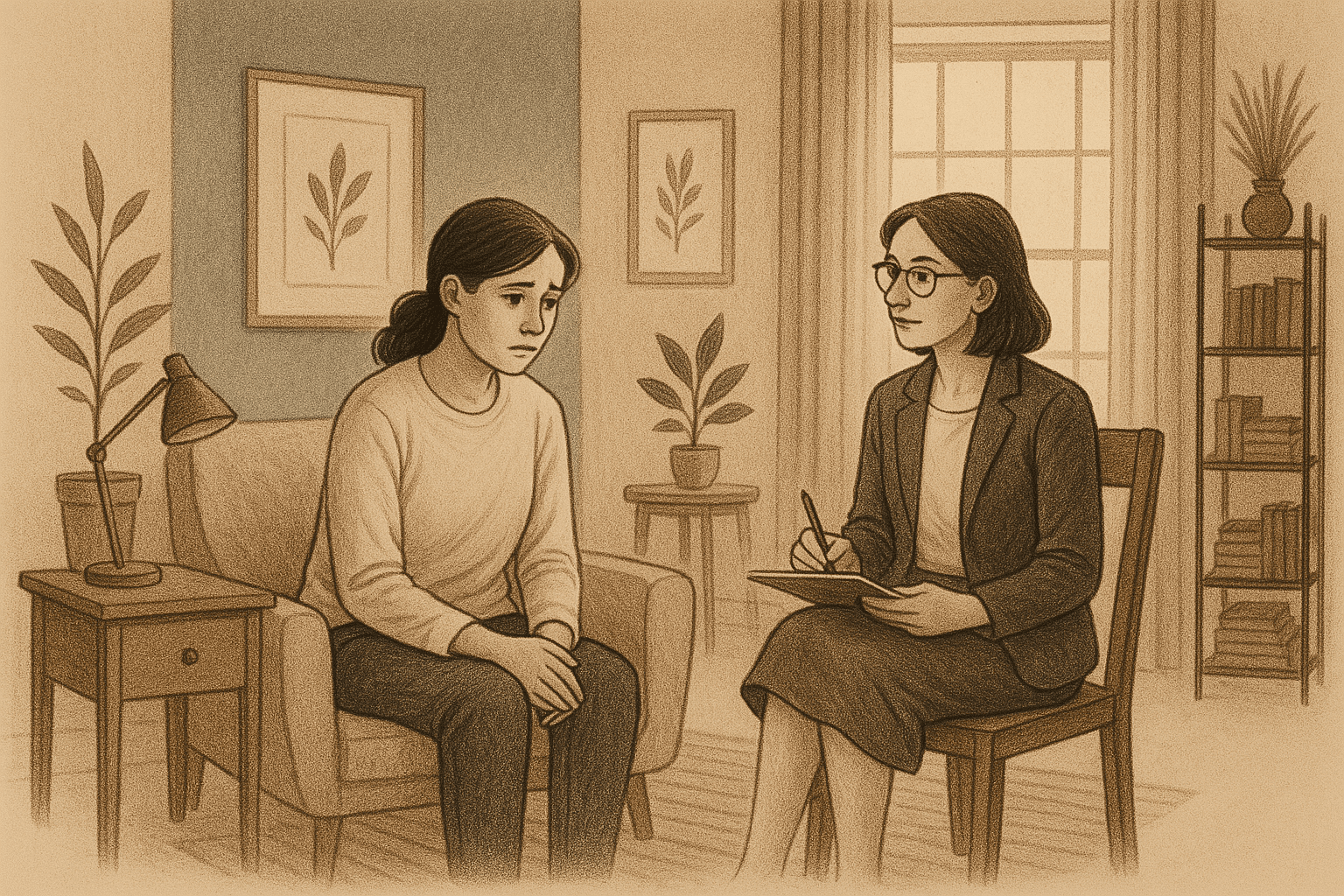Key Takeaways
- Postpartum psychosis requires immediate medical attention, with symptoms typically appearing within two weeks after childbirth.
- Warning signs include hallucinations, delusions, severe mood swings, and disturbed sleep patterns.
- With proper treatment combining medication, therapy, and support, most women recover completely from postpartum psychosis.
- Early intervention significantly reduces risks and improves outcomes for both mother and baby.
- A Mission For Michael (AMFM) offers specialized mental health programs accredited by The Joint Commission, with licensed professionals creating personalized treatment plans that address the unique challenges of postpartum psychosis.
Understanding Postpartum Psychosis
Welcoming a new life into the world is a profound experience, but for some, it can be accompanied by unexpected and severe mental health challenges. Postpartum psychosis is one such condition that demands our attention due to its potential impact on new mothers and their families.
Unlike the more commonly discussed postpartum depression, postpartum psychosis is characterized by a break from reality. It’s vital to understand this condition and support those affected by it to be able to raise awareness about its symptoms and treatments.
Definition and Rarity
Postpartum psychosis is a rare condition, affecting between 0.089 and 2.6 out of every 1,000 births. This translates to a small number of cases, but the severity of the condition necessitates immediate medical attention. It typically presents within the first two weeks after childbirth, but can occasionally appear later.
Founded in 2010, A Mission For Michael (AMFM) offers specialized mental health care across California, Minnesota, and Virginia. Our accredited facilities provide residential and outpatient programs, utilizing evidence-based therapies such as CBT, DBT, and EMDR.
Our dedicated team of licensed professionals ensures every client receives the best care possible, supported by accreditation from The Joint Commission. We are committed to safety and personalized treatment plans.
Recognizable Symptoms
Hallucinations and Delusions
One of the most striking symptoms of postpartum psychosis is experiencing hallucinations or delusions. These are false perceptions or beliefs that are not based in reality; for example, a new mother might hear voices or have irrational beliefs about herself or her baby. These symptoms require immediate medical attention.
Sleep and Energy Disturbances
Another common symptom involves disturbances in sleep and energy levels. A person with postpartum psychosis may experience insomnia or, conversely, excessive sleep. Additionally, they might exhibit unusually high energy levels or become easily agitated.
Risk to Self and Baby
The severity of postpartum psychosis lies in the potential risk it poses to both the mother and the baby. The mother may have thoughts of harming herself or her child.
Potential Causes
Hormonal Changes
The period following childbirth involves significant hormonal changes, which can affect mood and mental health. The abrupt drop in hormones such as estrogen and progesterone is believed to play a role in triggering postpartum psychosis.
Personal and Family History
A history of mental health disorders, either personal or familial, can increase the risk of developing postpartum psychosis. Women with a history of bipolar disorder or previous episodes of postpartum psychosis are particularly vulnerable.
Environmental Stressors
Environmental factors, including stress, lack of sleep, and insufficient support, can contribute to the onset of postpartum psychosis.

The transition to motherhood can be overwhelming, and without adequate support, the risk of developing this condition increases.
Diagnosis and Assessment
Diagnosing postpartum psychosis involves a thorough evaluation by healthcare professionals. This process is crucial as it helps differentiate postpartum psychosis from other postpartum mood disorders, such as depression or anxiety. Diagnosis includes:
- Observing symptoms and behaviors of the new mother.
- Conducting interviews with the mother and her family members.
- Reviewing the mother’s medical and psychiatric history.
These steps are necessary to accurately identify postpartum psychosis and rule out other potential causes of the symptoms.
Medical Evaluation
A medical evaluation is a critical component of the diagnostic process. By examining physical health, healthcare providers can identify any underlying medical issues that may contribute to the symptoms. For instance, thyroid dysfunction or vitamin deficiencies can sometimes mimic or exacerbate psychiatric symptoms.
In some cases, additional tests such as brain imaging may be necessary to rule out neurological conditions. These tests help ensure that the diagnosis is accurate and that the treatment plan addresses all contributing factors.
Overall, a thorough medical evaluation is vital for a comprehensive understanding of the individual’s health and the development of an effective treatment strategy.
Psychiatric Assessment

The psychiatric assessment involves evaluating the individual’s mental health, including their mood, thoughts, and behavior. This assessment helps identify the specific symptoms and their severity.
During the psychiatric evaluation, the healthcare provider will examine the mother’s emotional state, thought processes, and any hallucinations or delusions she may be experiencing. This information is essential for developing a targeted treatment plan.
Importance of Early Diagnosis
Early diagnosis of postpartum psychosis is vital for several reasons. First and foremost, it allows for prompt intervention, which can prevent the condition from worsening. Early treatment reduces the risk of harm to the mother and the baby.
Additionally, early diagnosis facilitates a quicker recovery and improves long-term outcomes. By addressing the symptoms promptly, healthcare providers can help the mother regain her sense of reality and stability more quickly.
Effective Treatments
Medication and Therapy
Medications, such as antipsychotics and mood stabilizers, are often prescribed to manage the symptoms of postpartum psychosis. These medications help stabilize the mother’s mood and reduce hallucinations or delusions.
Therapy, including cognitive-behavioral therapy (CBT), can also be beneficial. It provides the mother with coping strategies and helps her understand and manage her thoughts and emotions. Therapy can also involve family members, offering them guidance on how to support the mother effectively.
Inpatient Care Necessity
In severe cases, inpatient care may be necessary to ensure the safety of the mother and the baby. Hospitalization provides a structured and supportive environment where the mother can receive intensive treatment and monitoring.
Inpatient care allows healthcare providers to closely observe the mother’s symptoms, adjust medications as needed, and provide round-the-clock support. This level of care is crucial when there is a risk of harm to the mother or the baby.
Family and Peer Support
Family and peer support are invaluable components of treatment for postpartum psychosis. Loved ones can offer emotional support, help with daily tasks, and provide a sense of stability during the recovery process.
Peer support groups can also be beneficial, as they connect the mother with others who have experienced similar challenges. Sharing experiences and insights can reduce feelings of isolation and provide a sense of community.
Supporting Recovery
Building a Support Network
This network should include healthcare providers, family members, friends, and peer support groups. Each plays a unique role in supporting the mother throughout her recovery journey.
Healthcare providers offer medical and therapeutic support, while family and friends provide emotional and practical assistance.
Long-Term Management
Long-term management of postpartum psychosis involves ongoing treatment and support. Regular follow-up appointments with healthcare providers are essential to monitor the mother’s progress and adjust treatment as needed.
Prevention of Recurrence
Preventing a recurrence of postpartum psychosis is an important aspect of long-term management. This involves addressing any underlying risk factors, such as by managing stress, ensuring adequate sleep, and maintaining a healthy lifestyle.
Hope and Healing: The Path Forward with AMFM
Postpartum psychosis is a serious but treatable mental health condition that requires immediate professional intervention. At A Mission For Michael (AMFM), we understand the complex nature of this condition and its impact on both mothers and families.
Our specialized approach combines evidence-based therapies, medication management, and comprehensive support systems to guide new mothers through recovery.

With facilities across Southern California, Minnesota, and Virginia, we provide accessible care unique to each individual’s needs.
The benefit that comes with early intervention, proper treatment, and recovery from postpartum psychosis is possible and can be highly successful.
Frequently Asked Questions (FAQ)
Can postpartum psychosis recur in future pregnancies?
Yes, postpartum psychosis can recur in future pregnancies, especially if the individual has a history of the condition. However, with proper management and early intervention, the risk of recurrence can be significantly reduced.
What should loved ones do if they suspect someone has postpartum psychosis?
If you suspect someone has postpartum psychosis, encourage them to seek immediate medical attention. Offer your support and understanding, and help them connect with healthcare professionals who can provide the necessary care.
How long does treatment for postpartum psychosis typically last?
The duration of treatment for postpartum psychosis varies depending on the individual’s needs and response to treatment. Some may experience significant improvement within a few weeks, while others may require more long-term care.
Are there preventive measures for postpartum psychosis?
While postpartum psychosis cannot always be prevented, certain measures can reduce the risk of occurrence. These include managing stress, ensuring adequate sleep, and maintaining a healthy lifestyle.
How can AMFM help those experiencing postpartum psychosis?
At A Mission For Michael, we offer comprehensive mental health services unique to the needs of individuals experiencing postpartum psychosis. Our team of experts provides personalized care, support, and guidance throughout the recovery process.












